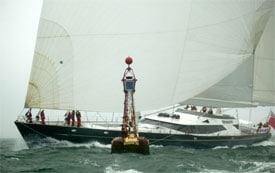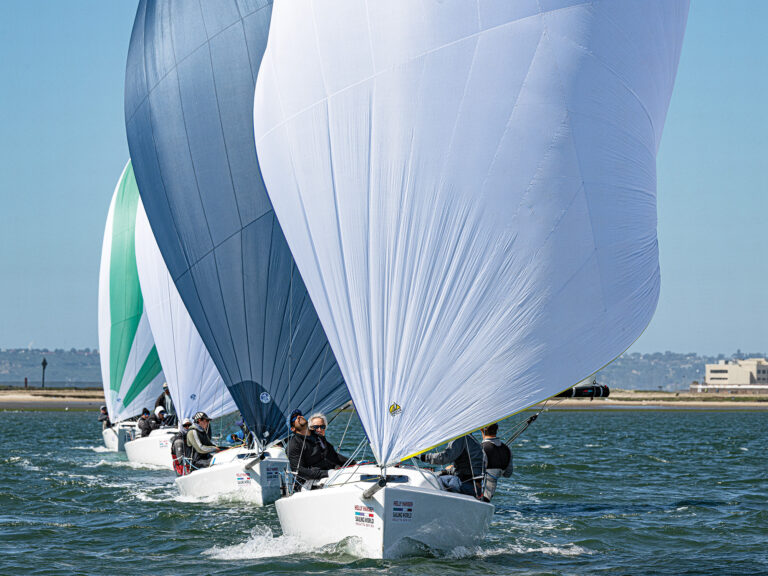
Drumbeat Finish
We crossed our first finish line off The Lizard at 5:45 a.m. in solid fog, zero visibility, and light air. We were all hoping to see something to make the finish line seem more tangible, but it wasn’t to be. We’d been jibing in light air for many hours, and very few of us got any sleep last evening. Those that slept were awoken in time to mark the crossing of the line, and the people who woke them probably took some small delight in waking the sleepers. Our chief competition, Whisper, finished late last night, and we have until 8:30 a.m. tomorrow to finish in order to beat them and take third place overall. Second is not far out of our grasp either. At this point we only need to make up 1.9 hours of time in order to snatch second place from Seleni. Fingers are crossed, tide tables and forecasts are being pored over, and we’re trimming our gennaker, main, mizzen staysail, and mizzen constantly. Right now, we’ve got tide with us, and that should last for another few hours. The wind is light, however, and we’re hoping for more soon. If the forecast holds true we’ll see the wind going forward and building slightly later in the day. We’d also like to see some clear skies, but will accept poor visibility in exchange for breeze. We spent last night dodging ship traffic in the traffic separation zones leading to the English Channel. The first mate, Steve Sims, was on the radar and the VHF all last evening, as he is this morning. His calm, professional voice on the VHF has kept all other shipping aware of our presence and the fact that we are restricted in ability to maneuver, a key ingredient to having ships alter course to avoid us. Of particular importance was not being run over by the tankship Gas Providence, which was approaching us from astern at 20 knots. The large vessel came within two miles of us, its basso profundo foghorn making our soprano horn sound a bit weak. This morning, it was tiny fishing vessels heading out from Cornwall, the accents of their Cornish crew thick enough to cut with a knife. We’ve got about a half-mile of visibility now, and we’re out of the main shipping lanes. In fact, we even glimpsed land briefly this morning, although it was gray and shrouded in clouds. It was far from being “England’s green and pleasant land,” that we’d all been anticipating. The English Channel is rich with history, especially on days like today. Sixty-one years ago this morning, Allied forces-English, American, Canadian, French, Polish, and Free French troops-began the invasion of France at Normandy, a few miles up the Channel from where we are now. The largest fleet of ships ever assembled stretched from Dover and many other Channel ports all the way to France, carrying soldiers, tanks, and endless amounts of supplies. The invasion had been postponed a day because of bad weather, and the soldiers landed in a small weather window forecast by military meteorologists. Dwight D. Eisenhower, Supreme Commander of Allied Forces, Europe, had two press releases written, one, which he released later in the day, describing a successful invasion of mainland Europe. The other, written and never released, was written in case the invasion failed. It’s important to remember days like June 6, 1944. If that invasion had failed we’d be living in a different world, and in all probability, we wouldn’t be sailing megayachts from New York to England. My father was there on D-Day; Cortie Wetherill’s father was, too, as, most likely, were relatives of many other racers taking part in the Rolex Transatlantic Challenge. We and the rest of the World owe thanks to those who have been aptly described as The Greatest Generation. On my part, I plan on raising a glass or two in a toast to those brave men when we get to Cowes.









